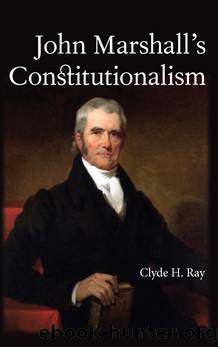John Marshall's Constitutionalism by Clyde Ray

Author:Clyde Ray [Ray, Clyde]
Language: eng
Format: epub
Tags: American Government, Political Science, History & Theory, Judicial Branch
ISBN: 9781438474427
Google: qmabDwAAQBAJ
Goodreads: 42453355
Publisher: SUNY Press
Published: 2019-05-31T10:28:17+00:00
The Native American Cases Revisited
The Courtâs first major decision concerning Native American land ownership, Johnson v. MâIntosh (1823), did not bode well for the tribes.14 Here was a case whose outcome bore directly on their future, yet neither party was Native American!15 The dispute related to a 1775 purchase of land in present-day Illinois from the Piankeshaw Indians by a number of colonists, including former Supreme Court Justice Thomas Johnson. Following the Revolutionary War, the Piankeshaw sold the previously purchased parcel of land to the federal government, of which 10,000 acres were later purchased by William McIntosh, a prominent real estate entrepreneur and fur trader.16 In response, Johnsonâs heirs sued to establish their title to the land as anterior to and thus invalidating the later purchase by McIntosh.
In deciding the case, the Court confronted the questions of whether land grants issued by the tribes were reviewable by federal courts and, generally, whether Native Americans possessed the power to purchase and sell titles to their land to private buyers. Marshallâs opinion would deliver a victory not only to McIntosh, but also to the federal government, while firmly establishing what the opinion deemed âthe right of society to prescribe those rules by which property may be acquired and preservedâ (21 U.S. 572). According to Marshall, the validity of land titles depended not on considerations of natural law or justice, but on the positive law of the land in which territory resided. Prior to the American Revolution, he asserted, the British gained title and possession to North American land through discovery, a rule âthe great nations of EuropeââBritish, French, Spanish, and other nation-statesâacknowledged in order to peacefully settle land claims during their shared exploration of North America.17 According to the Treaty of Paris, Great Britain relinquished to the states not only claims over government, but titles pertaining to the âpropriety and territorial rights of the United Statesâ (584). To be sure, Native Americans remained ârightful occupants of the soil, with a legal as well as just claim to retain possession of itâ (574). Yet the doctrine of discovery as expounded by Marshall ensured that âtheir rights to complete sovereignty as independent nations,â in his words, âwere necessarily diminished.â Of particular relevance to Johnsonâs heirs, the right of Native Americans âto dispose of the soil at their own will to whomsoever they pleasedâ was superseded by the sovereignty of the federal government and the commerce clause, which prohibited the sale of tribal lands by Native Americans to private citizens. Indeed, as Marshall put it, it was a âbroad principle which had always been maintained that the exclusive right to purchase from the Indians resided in the governmentâ (585). The validity of McIntoshâs title was confirmed, but more portentous for the Native Americans was the distinction Marshall had drawn between land occupation and ownership. As Marshall put it, to confuse the two concepts, or worse yet to conflate them, would call into question the validity of all non-Native land titles. Indeed, it would cast doubt on the legitimacy of the national government itself, an implication he strenuously avoided.
Download
This site does not store any files on its server. We only index and link to content provided by other sites. Please contact the content providers to delete copyright contents if any and email us, we'll remove relevant links or contents immediately.
The Secret History by Donna Tartt(19088)
The Social Justice Warrior Handbook by Lisa De Pasquale(12190)
Thirteen Reasons Why by Jay Asher(8910)
This Is How You Lose Her by Junot Diaz(6887)
Weapons of Math Destruction by Cathy O'Neil(6280)
Zero to One by Peter Thiel(5802)
Beartown by Fredrik Backman(5754)
The Myth of the Strong Leader by Archie Brown(5507)
The Fire Next Time by James Baldwin(5446)
How Democracies Die by Steven Levitsky & Daniel Ziblatt(5219)
Promise Me, Dad by Joe Biden(5153)
Stone's Rules by Roger Stone(5088)
A Higher Loyalty: Truth, Lies, and Leadership by James Comey(4964)
100 Deadly Skills by Clint Emerson(4925)
Rise and Kill First by Ronen Bergman(4789)
Secrecy World by Jake Bernstein(4753)
The David Icke Guide to the Global Conspiracy (and how to end it) by David Icke(4720)
The Farm by Tom Rob Smith(4513)
The Doomsday Machine by Daniel Ellsberg(4490)
